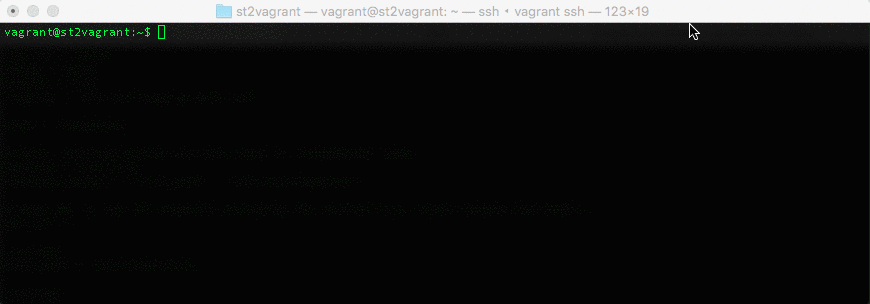June 27, 2016
by Lindsay Hill
StackStorm v1.5.0 has been released! More features, more improvements, and more bugfixes (sorry about those). Read on to hear about the changes, or fire up apt/yum and upgrade!
Spend a lot of your time using the st2 CLI? You’ll love this change: We’ve added CLI auto-completion to the st2 command. Type st2 then hit tab twice. You’ll get a list of all available arguments. This works multiple levels deep. Very handy when you can’t quite remember the right syntax:

Simple, but cool.
The StackStorm datastore service allows you to store common parameters and their values for reuse within sensors, actions and rules. Prior to v1.5, these were available to all users. Now you can scope variables to a specific user, and you can control who can read or write into those variables. By default, variables are stored in the system scope, but you can scope it to a specific user by adding --scope=user, e.g.:
st2 key set date_cmd "date -u" --scope=user
You can also store ‘secrets’ – values encrypted using a symmetric key. This needs to be enabled by the StackStorm administrator. Once it’s setup, users can store keys with the --encrypt flag. Only the administrator and the user who set the value will be able to decrypt it, if it was user-scoped.
The combination of user-scoping and encryption is particularly useful for users that need to store API secrets and credentials in the datastore.
We’ve got some more details in the Datastore documentation, and we’ll also be covering it in future blog posts.
Pack config files which are located inside the pack directory (config.yaml) have been deprecated in favor of the new pack configuration v2. The new config files are outside the pack directory, in the /opt/stackstorm/configs/ directory. The format is similar to the existing pack configs, but in addition to the static values they can also contain dynamic values. A dynamic value contains a Jinja expression which is resolved to the datastore item during run-time. This can include the new datastore secrets.
This approach offers more flexibility, and makes updating packs easier, since users don’t need to directly manipulate pack content anymore. This helps if you’re following the “infrastructure as code” approach (and you should!).
This change is backwards-compatible. Your existing configurations will continue to work, but we encourage you to plan to migrate to take advantage of the new features.
For more information, check the updated Pack Configuration docs. Keep an eye on this blog, where we’ll publish more details about the new configuration style, and how to migrate.
We added the --register-triggers flag to the st2-register-content script and st2ctl. When this flag is provided, all triggers contained within a pack triggers directory are registered, consistent with the behavior of sensors, actions, etc. This feature allows users to register trigger types outside the scope of the sensors.
The Changelog contains the full list, but here’s a selection of other improvements and new features in v1.5:
sensor_service and config variables available with the Sensor and PollingSensor classes. Those variables are now self.sensor_service and self.config.-y / --yaml flag to the CLI list and get commands. If this flag is provided, the response will be formatted as YAML. Related: We removed support for JSON format for resource metadata files. JSON has been deprecated since StackStorm v0.6, so we gave you fair warning. Now the only supported metadata file format is YAML.private_key parameter. Previously only raw key material was supported.st2 runner disable <name>, st2 runner enable <name>) which allows administrator to disable (and re-enable) a runner.Yes, there were bugs. We’re sorry. Now there’s fewer bugs. Some of the interesting fixes include:
pytz dependency to st2client requirements file. (bug-fix)ST2_AUTH_TOKEN and ST2_API_URL env variables in Python runner actions to match sensors).st2-submit-debug-info cleans up after itself and deletes a temporary directory it creates.Our community continues to contribute useful integrations. Here’s some new packs added since v1.4 was released:
Read the full Changelog to see all the details. We’ve also been tidying up the documentation as we go. I’ve been on a typo hunt, but I’m sure there’s more out there. It’s a race between creating and fixing typos. Some days I feel like the developers are winning, other days I get on top of it.
Thanks to all those Community members who contributed code to this release, including: Kale Blankenship, Peter Idah, Andrew Jones, Jon Middleton, Paul Mulvihill, Adam Mielke, Cody A. Ray, and Anthony Shaw.
With v1.4 we deprecated the AIO installer. This means everyone should now be using packages. Debian/Ubuntu users should use apt-get upgrade st2 to upgrade, while RHEL/CentOS users should use yum upgrade st2.
Of course, make sure you have a backup before upgrading. You should also read the Upgrade Notes.
Questions? Problems? Feedback? Get in touch via the StackStorm slack community or @Stack_Storm.